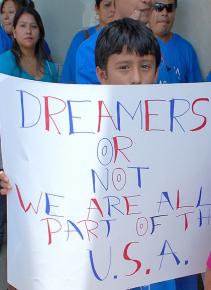Civil rights on the ballot in Maryland
reports on two ballot measures in Maryland that, if passed, would represent a step forward for same-sex marriage and immigrant rights.
ON ELECTION Day, Maryland voters will have their say on two questions that may, in the end, prove more significant than whether Barack Obama or Mitt Romney become president.
The two ballot initiatives--the Maryland Dream Act (Question 4) and same-sex marriage (Question 6)--will have deep implications for the future of civil rights, not only in Maryland, a relatively liberal state which is almost certain to go for Obama, but also for civil rights across the U.S.
The Dream Act referendum, which would allow undocumented immigrants to attend Maryland state schools at in-state tuition rates, is highly significant because, if passed, it will make Maryland the first state to pass such legislation.
Maryland Gov. Martin O'Malley signed a version of the Dream Act into law in May 2011. It has been tremendously popular and a rallying point for many organizations of undocumented students, or "Dreamers," and their allies, with teachers' unions in a prominent position in the campaign.
Unfortunately, various individuals and groups, including the state Republican Party and the bigoted "Help Save Maryland" coalition, gathered enough signatures to put the law on the ballot, claiming that it would cost the state too much money and give spots in the University of Maryland system to immigrants over more qualified and native-born (read: white) students. It is probable that thousands of these signatures, collected online, were false.

The Maryland act has many flaws. Among these are provisions that require undocumented students to prove that they have attended high school in Maryland for three years or more. Worse, it requires them to attend a community college for two years before transferring to a four-year university.
But if the Dream Act is successfully defended at the ballot box, it will be a vindication of the struggle of student Dreamers and their allies, as well as inspiration in the struggle for more and better educational rights in Maryland and across the country.
THE BALLOT question on same-sex marriage in Maryland is also a question of upholding an existing law. The Civil Marriage Protection Act, which Gov. O'Malley signed in March of this year, will allow same-sex couples to obtain a civil marriage license in Maryland beginning in 2013.
Maryland is less unique on the question of same-sex marriage in this election year--Maine and Washington also have similar ballot initiatives. If Question 6 passes, Maryland will join five states in which same-sex marriage is already legal.
This does not mean, however, that the Maryland law is less significant. The three referendums this year would, if passed, mark the first time that same-sex marriage was upheld by voters in a ballot initiative, which would deepen the sense of popular support for LGBT rights and embolden other efforts for marriage equality.
The battle for same-sex marriage in Maryland has been hard-fought and extremely bitter since the early 2000s, when LGBT couples began to defy state law by applying for marriage licenses. They may well see their efforts pay off after a long series of grassroots campaigns and lawsuits that have taken over a decade.
On the other side are some of the most powerful right-wing groups in Maryland and the nation, including the heavily funded group Defend Marriage and the Catholic clergy, which wields a large influence in this predominantly Catholic state.
Disgracefully, many Black state lawmakers have joined in the crusade against same-sex marriage, citing religious objections. Emmett C. Burns, Jr., a state delegate from Baltimore County, went so far as to appropriate the struggle for Black civil rights in this reactionary agenda, saying to gay activists, "If you want to compare same-sex marriage to civil rights as I know it, show me the Ku Klux Klan that invaded your home."
Fortunately, the NAACP campaign in support of Question 6 has challenged such reactionary views among Black lawmakers.
Both Question 4 and Question 6 look like they will pass by large margins, according to the most recent polls. Same-sex marriage has a 53 percent positive response to 42 percent negative, while the Dream Act has an even wider margin in favor.
The passage of both questions will put Maryland in the vanguard of civil rights for the whole nation--and mark setbacks to the forces that attempt to deny all Americans, undocumented and documented, gay and straight, their fundamental civil rights.


